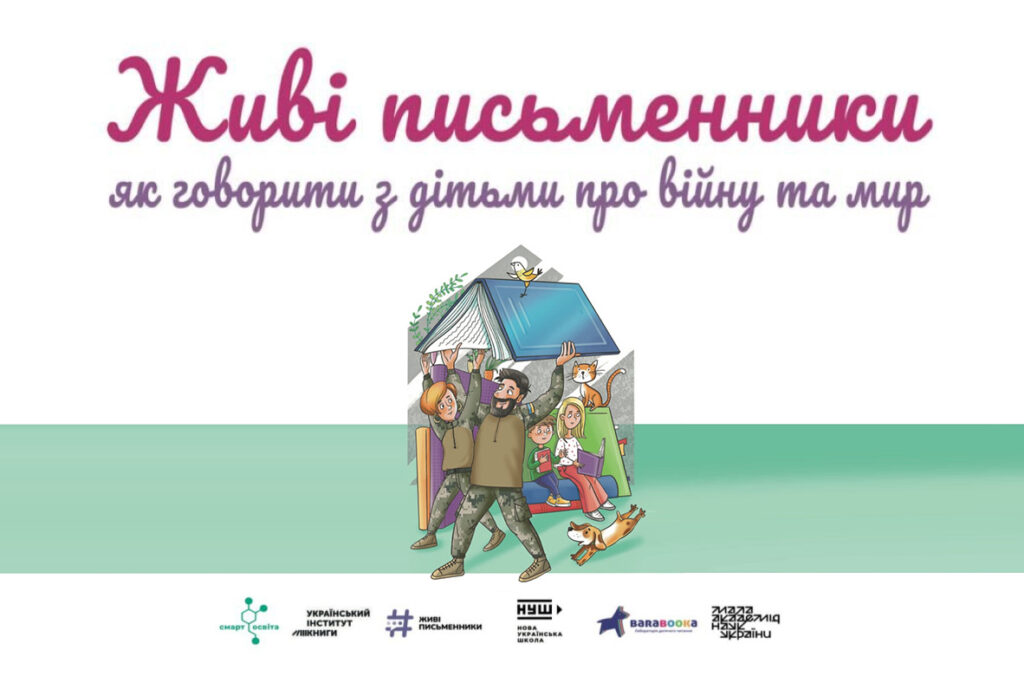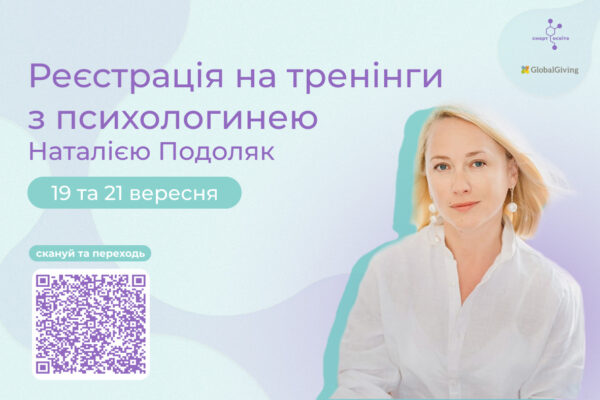

The third thematic guide for parents and educators has been released as part of the “Alive Writers. How to Talk to Children about War and Peace” project. It systematizes the research of literary critics, psychologists, and historians on “How to Talk to Children and Teenagers about War and Peace Through Literature”. The reading experts offer tools to facilitate the living of children’s and adolescents’ war experiences and traumatic events through the literary works of contemporary Ukrainian writers.
The guide can be downloaded here.
The guide consists of two main sections:
1 Methodological and psychological articles that explain the therapeutic effect of reading contain literary and psychological justification for working with publications for different age audiences of children and adolescents, describe methods of reading literature on complex topics, working with schoolchildren, etc. In particular, the adult audience will receive practical tips for answering familiar children’s questions about the war and referring them to relevant publications.
2 Selections of books with descriptions for preschool, primary, middle, and high school-age children. These articles include book covers, tags – topics covered by the work, a bibliographic line, a book description in the case context, and a commentary by psychologist Svitlana Roiz. Near many publications, you can find links and QR codes that lead to additional materials or the opportunity to read or listen to the book for free.
All the described techniques, tips, and tools result from more than a year and a half of work by project specialists in direct online and offline contacts and conversations with children and adolescents in locations across Europe. These included dozens of readings and discussions with teachers in Ukraine, Poland, and the Czech Republic at educational, library, and public areas.
“We are convinced that reading and contact with books is one of the most effective tools in accompanying children and adolescents through the dangerous experiences of war and in rethinking these experiences. After what we have been through, we are all looking for resources and ways to live in a new world, a new world that will never be the same, and with experiences that we and our children would rather not have to go through. So we consciously decided that we would also talk about the large-scale and desirable end of the war – PEACE”, comments the project manager, Tetiana Stus.
Contents of the guide
- introduction by project manager Tetiana Stus;
- psychological advice from Svitlana Roiz, as well as the topic “How to talk about war and peace with preschoolers and primary school children”;
- psychologist Victoriia Samokhval: “How to talk about war and peace with teenagers”;
- expert Anna Tretiak: “Children’s and teenage literature on war: how to read and discuss it with children?”
- expert Olha Kupriian: “The experience of children in forced emigration and returning home”;
- experts Anna Tretiak and Olha Kupriian: “Methods of conducting an integration lesson for grades 1-4 called “Our Experiences”;
- direct speech of the Alive Writers: Hryhorii Falkovych, Olena Maksymenko, Anna Prosvietova, Oksana Lushchevska, Larysa Denysenko, Anna Khromova, Valentyna Vzdulska, Yuliia Yuliukha, Serhii Loskot;
- a list of publications and a description of each book in three age categories: for preschoolers and primary school age, for middle school age, and high school age;
- a long list of children’s and teenage books on war and war experience written by Ukrainian writers (as of the end of 2023);
- information about the project’s experts and organizations that helped implement the project.
The guide is a continuation of the #AliveWriters campaign launched in 2019 by the Ukrainian Book Institute, in which a team of BaraBooka specialists and Smart Osvita experts and psychologists develop materials about contemporary Ukrainian children’s literature and present modern methods of working with it in a concise and accessible form.
You can find previous works on the Alive Writers website and under the hashtag #howtotalktochildrenaboutwar.
Halyna Tytysh, head of the “Smart Osvita” NGO and head of the project’s expert council:
“We were often asked by teachers how to answer students’ questions about the war. I hope that in this guide, teachers and parents will find inspiration, ideas, and recommendations for such difficult conversations.”
Project manager: Tetiana Stus
Head of the expert council: Halyna Tytysh
Experts: Mariia Artemenko, Olha Kupriian, Anastasiia Muzychenko, Svitlana Roiz, Tetiana Stus, Halyna Tkachuk, Anna Tretiak.
Psychologists: Svitlana Roiz, Victoriia Samokhval.
Historian: Yevhenii Shelest.
Editor: Zhanna Kapshuk.
Cover art: Maryna Shuturma.
The project is implemented by the “Smart Osvita” NGO and the BaraBooka Children’s Reading Laboratory of the Minor Academy of Sciences of Ukraine with the support of the Ukrainian Book Institute at the expense of Ukraine’s state budget.



